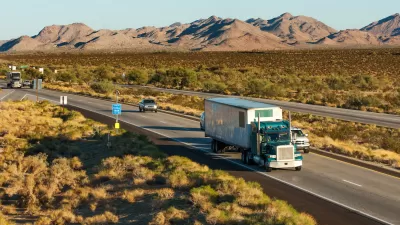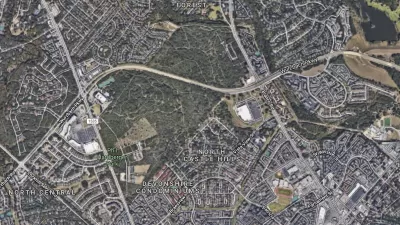Some in Texas are worried about the structures that house Google's Fiberoptic Cables, complaining that the huts are ugly and take up too much park space.
Google had planned to build a series of structures to house its fiber optic cable for its internet service, but after completing construction of some of these buildings the company has faced pushback. Ivy Taylor, council woman for San Antonio's District 3, summarized residents’ concerns about Google Fiber huts. "'We have a serious problem with the placement of several Google Fiber 'huts' in city parks and a vacant lot in a Southeast Side neighborhood. These fairly large structures threaten to reduce neighbors' access to their parks,' Taylor said in one email," Kristen Mosbrucker reports for the San Antonio Business Journal.
The huts, which Google called the system's nerve centers, are cement buildings ringed with fences. "Initially, 40 city-owned parcels were identified for use, mostly near libraries and fire stations but also public parks. These fiber huts are the second major step in building the network that can sell internet speed up to 1,000 megabits per second," Mosbrucker writes. Since facing complaints, Google engineers have reworked the design so as to need only 17 buildings. The 15 that the company has yet to build are currently on hold for permits from the city. "In October 2016, Google Fiber announced it was hitting the pause button for deploying a fiber network in Dallas but planned to continue in San Antonio," Musbrucker writes.
FULL STORY: City of San Antonio pumps the brake on Google Fiber construction

Alabama: Trump Terminates Settlements for Black Communities Harmed By Raw Sewage
Trump deemed the landmark civil rights agreement “illegal DEI and environmental justice policy.”

Study: Maui’s Plan to Convert Vacation Rentals to Long-Term Housing Could Cause Nearly $1 Billion Economic Loss
The plan would reduce visitor accommodation by 25% resulting in 1,900 jobs lost.

Planetizen Federal Action Tracker
A weekly monitor of how Trump’s orders and actions are impacting planners and planning in America.

Waymo Gets Permission to Map SF’s Market Street
If allowed to operate on the traffic-restricted street, Waymo’s autonomous taxis would have a leg up over ride-hailing competitors — and counter the city’s efforts to grow bike and pedestrian on the thoroughfare.

Parklet Symposium Highlights the Success of Shared Spaces
Parklets got a boost during the Covid-19 pandemic, when the concept was translated to outdoor dining programs that offered restaurants a lifeline during the shutdown.

Federal Homelessness Agency Places Entire Staff on Leave
The U.S. Interagency Council on Homelessness is the only federal agency dedicated to preventing and ending homelessness.
Urban Design for Planners 1: Software Tools
This six-course series explores essential urban design concepts using open source software and equips planners with the tools they need to participate fully in the urban design process.
Planning for Universal Design
Learn the tools for implementing Universal Design in planning regulations.
Caltrans
Smith Gee Studio
Institute for Housing and Urban Development Studies (IHS)
City of Grandview
Harvard GSD Executive Education
Toledo-Lucas County Plan Commissions
Salt Lake City
NYU Wagner Graduate School of Public Service




























